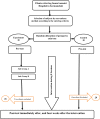Group reminiscence for hope and resilience in care-seekers who have attempted suicide
- PMID: 31969928
- PMCID: PMC6964065
- DOI: 10.1186/s12991-020-0257-z
Group reminiscence for hope and resilience in care-seekers who have attempted suicide
Abstract
Background: The rate of attempting suicide is growing due to the increasing social and economic problems and a variety of stresses taken by individuals in their lives. Helping people, boosting hope, and improving resilience to life hardships might be helpful in this area. This paper is an attempt to determine the effects of group reminiscence on hope and resilience in care-seekers who have attempted suicide.
Method: The study was carried out as a quasi-experimental interventional study. The participants were 57 care-seekers with a history of attempting suicide who met the inclusion criteria. The sampling was done through convenience sampling and the participants were grouped into control (n = 29) and experimental (n = 28) groups randomly. The experimental group received integrated reminiscence sessions (eight sessions; 60-90 min). Hope and resilience of the subjects were measured using Schneider's Hope Scale and Connor and Davidson's Resilience Scale. The scales were filled out by the subjects before, immediately after, and 4 weeks after the intervention.
Results: The mean scores of hope in the experimental and control groups were 34.60 and 38.04, respectively, before the intervention. These figures immediately after the intervention were 44.07 and 35.96 in the experimental and control groups, respectively. 4 weeks after the intervention, the mean scores of hope in the experimental and control groups were 44.39 and 35.79, respectively, which is a statistically significant difference (p < 0.05). In terms of resilience, the mean scores in the experimental and control groups before the intervention were 48.17 and 57.51, respectively; and immediately after the intervention, these figures were 67.71 and 52.75, respectively. 4 weeks of the intervention, the mean scores of resilience were 59.17 and 52.24, respectively, which is a statistically significant difference (p < 0.05).
Conclusion: Group reminiscence has a positive effect on boosting hope and resilience in care-seekers who have attempted suicide.
Keywords: Hope; Reminiscence; Resilience; Suicide.
© The Author(s) 2020.
Conflict of interest statement
Competing interestsThe authors declare that they have no competing interests.
References
-
- Sadock BJ, Sadock VA, MD PR. Kaplan and Sadock's synopsis of psychiatry: behavioral science clinical psychiatry, 11th edition. Philadelphia: Wolters Kluwer; 2014, p. 897–906.
LinkOut - more resources
Full Text Sources
Miscellaneous


